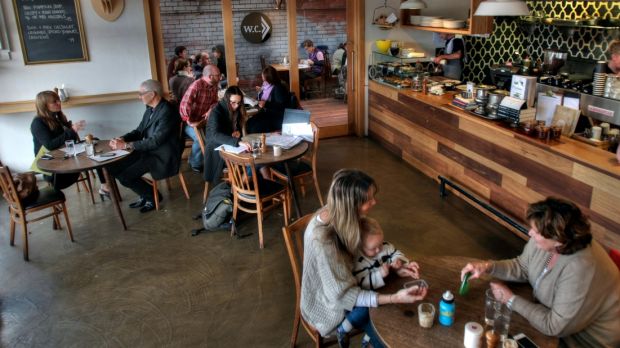A recent break-in was the straw that broke the camel's back for cafe owner and chef Matt Wilkinson. It was the third robbery in 18 months and he was considering a cashless policy at his popular eatery Pope Joan anyway.
"It was the nail in the coffin for me," Wilkinson explains.
More BusinessDay Videos
Cash no longer king in Australia
Credit cards have replaced cash as the most used method of payment in Australia. 'Tap and go' payments have led the change.
"I got the phone call at three o'clock in the morning, it was my day off and I was supposed to be spending the day with my family. I was like, 'that's it'.
"I just don't want to keep getting broken into."

"It's a no-brainer"
Within two weeks the Melbourne cafe had signage on its menus, window and door. Its no cash policy was introduced on Tuesday, but there will be wiggle room for customers who can't pay by card.
"Any regulars can set up an account if they've got a problem," Wilkinson explains.
"There will be a glass jar and you've got to have correct change and if you don't, nearest to it because there will be no change.
"If it's a little bit under, so what. If it's a little bit over, I'm sure you'll be OK with it. But I'm not going to carry cash in a business anymore."

By accepting card payments only, Wilkinson expects to save money in insurance premiums, point of sale systems and the cost of employing staff to manage cash.
"It costs me about $270 a week to touch money," he says.

"So if you work that out, that's counting the float, balancing the cash at the end of the day, my office manager doing my weekly analysis, then that staff member going to the bank three times a week.
"We've run this business now for seven years. Back then it used to be 60 per cent cash and 40 per cent card, now its 25 per cent cash, 75 per cent card.
It's a no-brainer and anyone who does whinge - thank you for your custom, but there are plenty of other places to get a coffee and something to eat.
Matt Wilkinson
"I think it speaks for itself when nearly 80 per cent of your customers use cards anyway. It's a no-brainer and anyone who does whinge – thank you for your custom, but there are plenty of other places to get a coffee and something to eat."
Pope Joan is a foodie haven in Melbourne and together with The Pie Shop, a new business Wilkinson has opened next door, it turns over $2.4 million a year.

Cash no longer king
Cash is seemingly no longer king in the modern economy. The introduction of contactless payments and wearable technology has led some experts to believe Australia will become a cashless society in the next five to 10 years.
Reserve Bank of Australia figures show cash usage in 2010 fell to 73 per cent and card payments rose to 21 per cent. But by 2013, the trend towards cash-free payments gained momentum and cash payments dropped to 60 per cent and card usage rose to 33 per cent.

Bar Americano in Melbourne instituted a cashless policy 18 months ago and owner Matthew Bax says it makes financial sense.
"My accountant loves it, it saves us time and money and customers have barely had to shift gear," he says.

"Tips suffer a bit I think under the payWave culture, but I don't think that is necessary a cashless bar problem.
"I believe in a cashless economy, it just seems to make sense; it's convenient, it's efficient and it's honest."

One year in a 'non-issue'
One year into going cashless, Brisbane cafe Pablo & Rusty's Coffee Roasters founder Saxon Wright says it's a "non-issue".
"There was probably a small percentage of people who were genuinely annoyed and who we never saw again, but the net benefit with the good will from all the other customers was well worth it," he says.
"It's about walking customers through the journey, it's about helping them see their options.
"This is definitely a transition that's going to happen and cafes need to warm customers up to it because it's not going to happen automatically."
High volume, low value
But not everyone is hankering for a cashless future.
Declan Lee, co-founder of gelataria chain Gelato Messina, says it wouldn't make sense for his business to reject cash.
"We're a high volume, low value order business so when you go to our stores and you buy a scoop for $4.80, you don't always think to put it on a card," he says.
"We just have heaps of small transactions and it costs us heaps of money whereas cash doesn't cost us anything and that's why I like it."
















8 comments
New User? Sign up